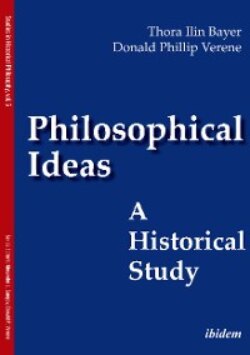Описание книги
The history of philosophy, approached in this way, is a treasure house of ideas that constitutes the subject matter of the contemplative life.

Реклама. ООО «ЛитРес», ИНН: 7719571260.
Preface
Introduction: Philosophical Ideas. Pythagoras’s Answer to Leon
Simonides’ Discovery
Aristotle’s Protrepticus
Plutarch’s Delphic Epsilon
1 Plato’s Poetics: A Reexamination. The City in Speech
The Ancient Quarrel
The Myth of Er
The True Homer
2 Hegel’s Dialectic: A Reexamination. Scepticism
Aufheben
Categories
The Absolute and the Owl of Minerva
3 Vico’s Science: A Reexamination. Geometry
Ius Gentium
Axioms
The Eye of Providence
4 Cassirer’s Symbol: A Reexamination. The Copy Theory
Tonality
Basisphânomene
The Bow and the Lyre
Afterword: On the Contemplative Life. Aristotle’s Ethics
Cicero’s Art
Machiavelli’s Robes
The Republic of Letters
Notes. Introduction: Philosophical Ideas
Chapter 1. Plato’s Poetics: A Reexamination
Chapter 2. Hegel’s Dialectic: A Reexamination
Chapter 3. Vico’s Science: A Reexamination
Chapter 4. Cassirer’s Symbol: A Reexamination
Afterword: On the Contemplative Life
Works Cited
ibidem-Press, Stuttgart
Introduction: Philosophical Ideas
.....
Among Aristotle’s early writings, the most important is his Protrepticus, the original of which has been lost in its entirety, but its essential content and narrative has been reconstructed. It is a “hortatory essay” (logos protrepticos), an exhortation intended to urge those who would take up the study of philosophy—to do so. The most famous passage, as it appears in the reconstructed text of Anton-Hermann Chroust, is: “The term ‘to philosophize’ (or, ‘to pursue philosophy’) implies two distinct things: first, whether or not we ought to seek [after philosophic truth] at all; and second, our dedication to philosophic speculation [philosophon theoria]” (par. 6).2
With this assertion as his theme, Aristotle pursues its meaning. He says that “there is a science of truth as well as a science of the excellence of the soul. . . . philosophic wisdom (phronesis) is the greatest of all goods, and, at the same time, the most useful of all things” (pars. 35–36). Aristotle concludes: “Since human life is capable of sharing in this faculty [of reasoning and of acquiring wisdom], however wretched and difficult it may be, it is yet so wisely ordained that man appears to be a god when compared with all other creatures. . . . This being so, we ought either to pursue philosophy or bid farewell to life and depart from this world, because all other things seem to be but utter nonsense and folly” (pars. 105–106). Philosophic wisdom takes two forms, as contemplative speculation (theoria) and as guiding conduct to achieve well-being (phronesis).
.....